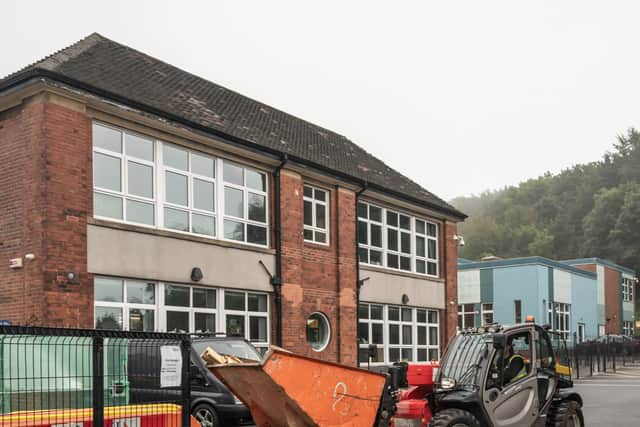School concrete closures: Scotland to be assessed for RAAC after 104 English school buildings closed
and live on Freeview channel 276
The Scottish Government has announced that school buildings will be assessed north of the border after more than 100 English school buildings were forced to close due to the use of a concrete material prone to collapse.
Around 104 schools in England have been told to close off some of their buildings after the presence of reinforced autoclaved aerated concrete (RAAC), a material prone to collapse, was found. Pupils at the schools will be placed in temporary accommodation.
Advertisement
Hide AdAdvertisement
Hide AdLocal authorities are now expected to prioritise remedial work to school buildings in Scotland after the Scottish Government confirmed that work is underway to assess the use of the material in education facilities as well as health facilities. Scottish schools returned to term time in mid-August.
A Scottish Government spokesman said: “This is an issue the Scottish Government takes very seriously and so we have been working with partner bodies to understand the scope and nature of what we are dealing with. Reviews of RAAC in property are being conducted by local authorities, NHS Scotland and other public sector organisations.
“Work is currently under way with local authorities to understand the presence of RAAC across the school estate. We have received returns for the majority of the school estate and expect to have full returns from all local authorities this week.
They added: “For those schools where RAAC is found, appropriate mitigation plans have and will be put in place to ensure the safety of pupils and staff. Ministers are clear that they expect local authorities to prioritise this work. We issued guidance and background on RAAC to the Association of Directors of Education in Scotland and Scottish Heads of Property Services networks. We will continue to work closely with all those bodies in responding to the challenge.”
Advertisement
Hide AdAdvertisement
Hide Ad

RAAC is a lightweight material which was commonly used in construction from the 1950s until the mid 1990s. The material was assessed after it was linked to the collapse of a roof at Singlewell Primary School in Kent in 2018.
Guidance from he Institution of Structural Engineers advises that not all building with RAAC would face closure. Instead buildings should only be closed if it is deemed to be in poor condition and considered high risk - those not deemed high risk will be able to be managed in place.
The Scottish Government said that remedial work will take place if high-risk RAAC is found. Like English pupils, Scottish pupils would use temporary accommodation. However, a government minister has said that public buildings in Scotland pose "no immediate risk to safety".
Speaking to BBC Scotland’s The Sunday Show programme, Wellbeing Economy Secretary Neil Gray said: “At the moment, there is no immediate risk to people using these buildings and that is why we continue to support our local authority partners, NHS boards and others, that have RAAC in their buildings to ensure that remains the case, and if there are issues to be resolved, that mitigations are taken to ensure people’s safety.”
Advertisement
Hide AdAdvertisement
Hide AdIn figures collated by the Scottish Liberal Democrats in May found the presence of RAAC was detected in at least 37 school buildings in Scotland. This included nine schools in Dumfries and Galloway, seven in Aberdeen, six in Clackmannanshire and five in West Lothian.
Schools in Dundee, the Highlands and Islands, North Lanarkshire, Aberdeenshire, Argyll and Bute, East Lothian and Perth and Kinross were also found to have RAAC.
Scottish Lib Dem leader Alex Cole-Hamilton has urged the Scottish Government to reveal which schools are affected by the assessments. He said: “Ministers need to pull their heads out of the sand and take action. We now know from England that beams previously assessed as safe can still catastrophically collapse. Does Scotland have to have a tragedy before ministers take this seriously?"
Cole-Hamilton added: “This issue has been bubbling up for months and its ridiculous that the Scottish Government have failed to use the summer to rigorously assess the scale of the problem and get repairs under way.”
Comment Guidelines
National World encourages reader discussion on our stories. User feedback, insights and back-and-forth exchanges add a rich layer of context to reporting. Please review our Community Guidelines before commenting.
